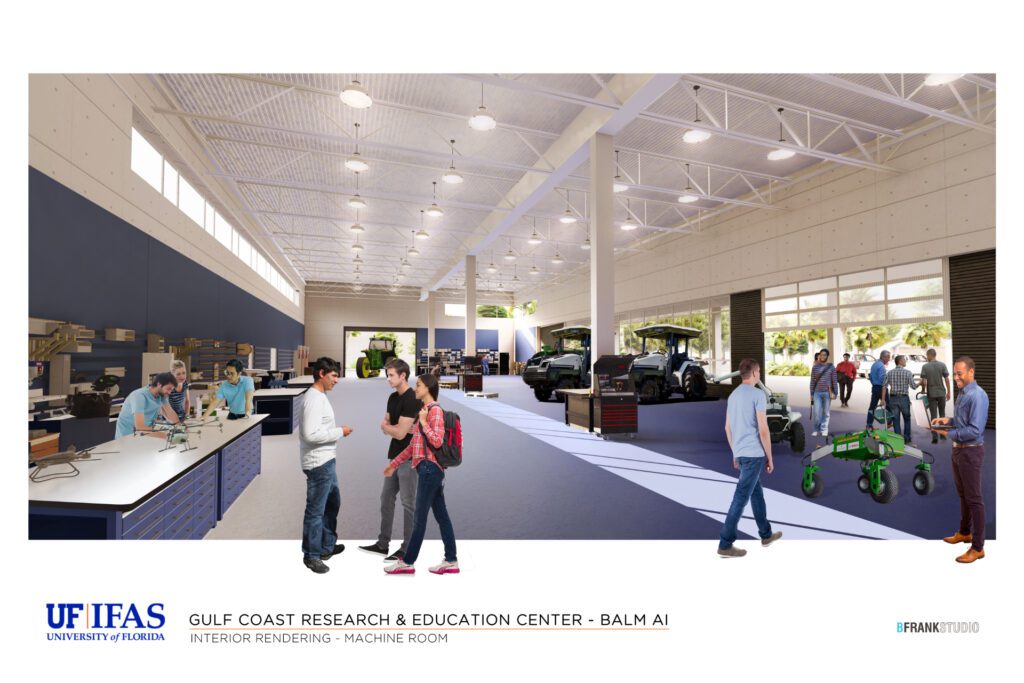by BRAD BUCK, KAREN BRASHER, and ERIN YATES
UF/IFAS
Artificial intelligence (AI) can help feed the world and preserve our natural resources. To maximize the bandwidth of AI, scientists are working together to develop robotics and precision agriculture, use drones effectively and more. Recognizing the strength of collaboration, universities across the South are launching centers where researchers combine brain power and data to help agricultural producers.
Developing technology faster
To expedite the ability of AI technology to solve agricultural and environmental problems, the University of Florida Institute of Food and Agricultural Sciences (UF/IFAS) plans to build a 19,000-square-foot AI hub at the Gulf Coast Research and Education Center (GCREC) in Balm, about 25 miles southeast of Tampa.
The Center for Applied Artificial Intelligence in Agriculture will serve as a world-class research, Extension and development facility, led by GCREC Director Jack Rechcigl and associate director, Nathan Boyd.
At the hub, AI scientists will collaborate with UF/IFAS researchers and industry to study ways to breed plants that resist pests and disease, thus boosting crop yields for farmers. The facility will include office space and space for workshops and creating technology prototypes to get innovations to market quicker.
“The survival of our agricultural industries like fruit and vegetable production depends on the development of new technologies utilizing AI to assist growers in production,” Rechcigl says.
Rapid Robotics
In 2023, Mississippi State University launched the Agricultural Autonomy Institute (AAI), a pioneering interdisciplinary center focused on advancing autonomous technologies in agriculture.
AAI aims to transform farming with innovations in robotics, artificial intelligence and remote sensing, improving on-farm precision, efficiency and economic growth. It leverages MSU’s strong foundation in precision agriculture, aiming to boost productivity and address labor shortages, which could position Mississippi as the “Silicon Valley of agricultural autonomy.”
Scientists in the university’s Mississippi Agricultural and Forestry Experiment Station (MAFES) are developing autonomous systems to change the future of agriculture:
- Robotic systems enhance cotton harvesting by selectively picking mature bolls and employing AI for non-destructive grain sensing.
- Autonomous systems estimate crop yields early in the season and detect volunteer cotton plants, integrating AI to bolster precision agriculture.
Through rigorous research, public demonstrations, and educational outreach, MSU is equipping a new generation of agricultural professionals, ensuring continued leadership in integrating AI into farming and addressing broader goals of food security and environmental sustainability.
A ‘Future Farm’
In June, the University of Georgia College of Agricultural and Environmental Sciences (CAES) and Grand Farm, a leading innovator in agricultural technology, announced a collaboration to create a robust regional agricultural innovation ecosystem.
Situated on 250 acres in Perry, Georgia, CAES and Grand Farm are coming together to build a working innovation farm. With field projects planned for 2025, UGA Grand Farm will harness the power of precision agriculture, robotics and data analytics to increase productivity, conserve resources and ensure food security for future generations.
“By bringing together the college’s world-class researchers and the UGA Institute for Integrative Precision Agriculture with Grand Farm’s cutting-edge technologies, we will revolutionize the way we feed and clothe the world’s population,” says CAES Dean and Director Nick T. Place.
The new Tifton Integrative Precision Agriculture Research, Education and Demonstration Laboratory will be the first in the Southeast to provide state-of-the-art collaborative spaces, autonomous equipment and job training for the next generation of agricultural leaders.
“We are thrilled for this opportunity to demonstrate the latest technologies across Georgia’s commodities,” says UGA-Tifton Assistant Dean Michael Toews. “These labs and collaborative spaces will be within walking distance to horticultural, row, turf and citrus plots, providing stakeholders the ability to see and test technologies for adoption on their farms.”

